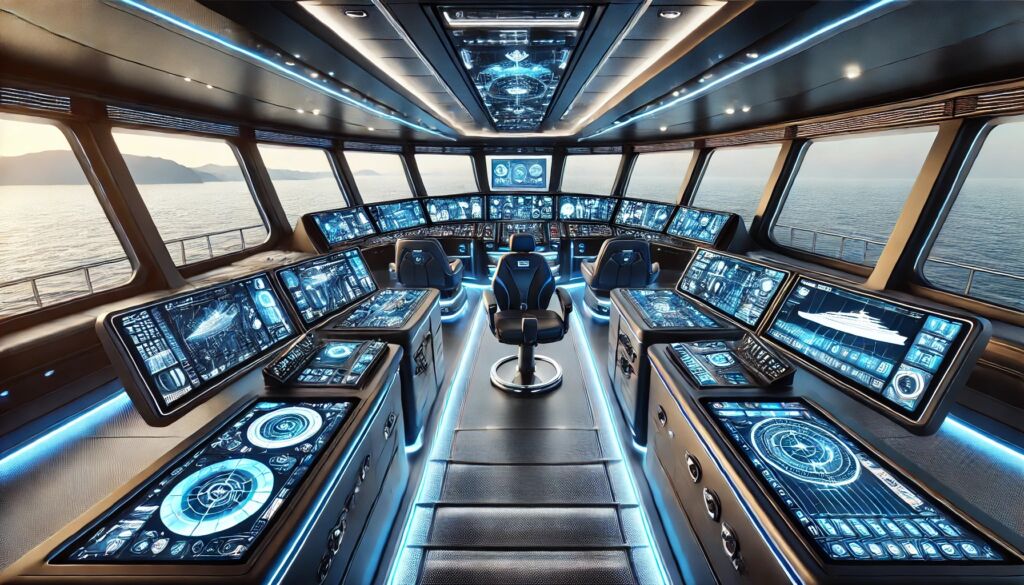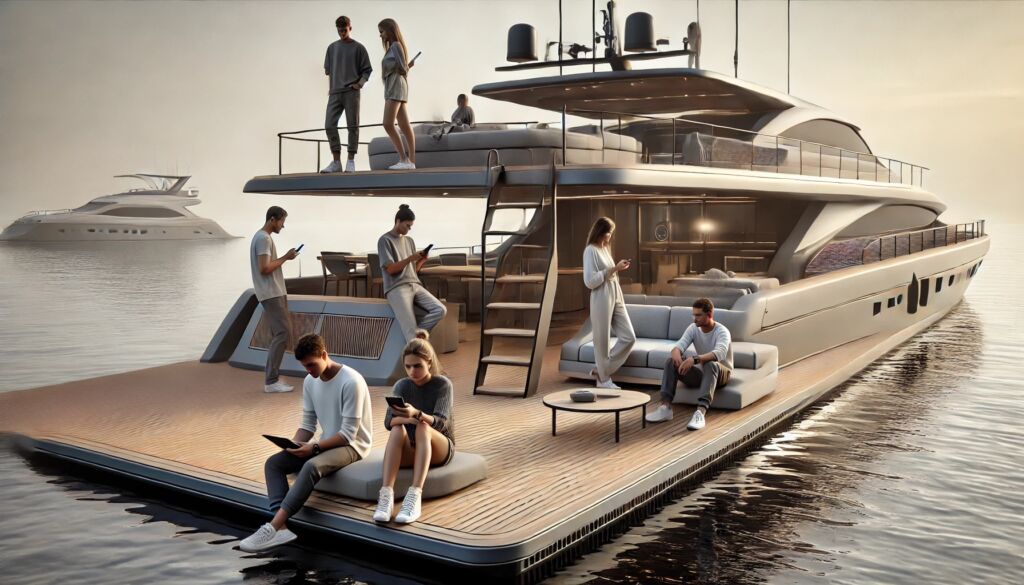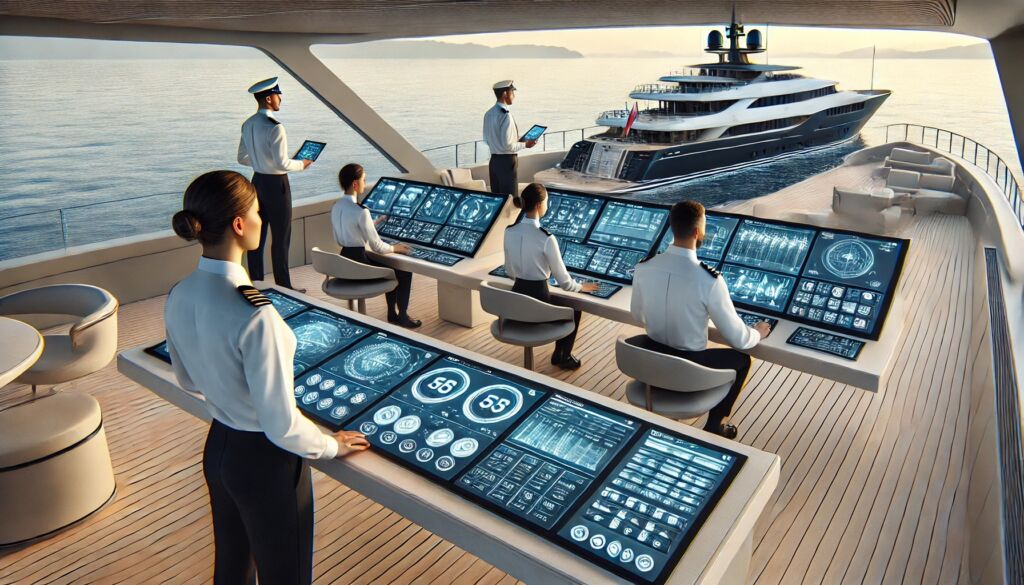The superyacht industry has long been synonymous with luxury, exclusivity, and amazing experiences on the high seas. As we move further into the 21st century, the landscape of superyacht management is evolving rapidly, driven by technological advancements, changing consumer preferences, and a growing emphasis on sustainability. This article explores the key trends and innovations shaping the future of superyacht management, offering insights for industry professionals and enthusiasts alike.
1. Technological Advancements

A. Smart Yachts
One of the most significant trends in superyacht management is the rise of smart technology. Today’s superyachts are increasingly equipped with advanced systems enhancing both safety and comfort. From automated navigation systems to smart home technologies which control lighting, climate, and entertainment systems, these innovations are transforming the onboard experience.For instance, many new builds are incorporating Internet of Things (IoT) devices allowing Owners and crew to monitor vessel performance in real-time. This data-driven approach not only improves operational efficiency yet also enhances maintenance schedules, reducing downtime and costs.
B. Virtual Reality (VR) and Augmented Reality (AR)
Virtual reality and augmented reality are also making waves in the superyacht sector. These technologies are being used for everything from design visualization to virtual tours for potential buyers. Imagine being able to explore a yacht’s interior before it’s even built or experiencing a simulated voyage from the comfort of your home. This immersive experience can significantly influence purchasing decisions and client engagement.
2. Sustainability Initiatives
 As environmental concerns continue to rise globally, sustainability has become a crucial focus in superyacht management. Yacht Owners are increasingly looking for ways to reduce their carbon footprint and operate more sustainably.
As environmental concerns continue to rise globally, sustainability has become a crucial focus in superyacht management. Yacht Owners are increasingly looking for ways to reduce their carbon footprint and operate more sustainably.
A. Eco-Friendly Designs
Many shipyards are now prioritizing eco-friendly designs incorporating sustainable materials and energy-efficient technologies. Hybrid propulsion systems, solar panels, and advanced waste management systems are becoming standard features in new builds. These innovations not only help protect marine environments and also appeal to a growing market of environmentally conscious clients.
B. Regulatory Compliance
In addition to adopting sustainable practices voluntarily, yacht managers must stay informed about evolving regulations regarding emissions and environmental impact. The International Maritime Organization (IMO) has set ambitious targets for reducing greenhouse gas emissions from shipping, including superyachts. Compliance with these regulations will be essential for maintaining operational licenses and ensuring long-term viability in the market.
3. Changing Consumer Preferences

The demographics of yacht ownership are shifting as younger generations enter the market. Millennials and Gen Z are driving changes in how yachts are perceived and used.
A. Experience Over Ownership
Younger consumers often prioritize experiences over ownership, leading to a rise in yacht charters rather than outright purchases. This trend presents an opportunity for yacht management companies to offer bespoke charter experiences which cater to this demographic’s desire for unique adventures without the long-term commitment of ownership.
B. Personalization
Today’s yacht owners expect a highly personalized experience tailored to their preferences. From custom itineraries to bespoke onboard services, yacht managers must be adept at understanding individual client needs and delivering exceptional service. Utilizing data analytics can help managers anticipate preferences based on past behaviors, ensuring a seamless experience.
4. Enhanced Crew Management

The role of crew in superyacht management is evolving alongside technological advancements and changing consumer expectations.
A. Training and Development
As technology becomes more integrated into yacht operations, ongoing training for crew members is essential. Managers must invest in training programs to equip crew with the skills needed to operate advanced systems effectively while also providing top-notch service to guests.
B. Crew Wellbeing
The wellbeing of crew members is gaining attention as an essential aspect of successful yacht management. Long hours at sea can lead to burnout; therefore, implementing policies which promote work-life balance is crucial. Offering mental health support, adequate time off, and opportunities for professional development can enhance crew satisfaction and retention rates.
5. The Role of Data Analytics

Data analytics is revolutionizing how superyachts are managed by providing insights which drive decision-making processes.
A. Predictive Maintenance
By leveraging data analytics tools, yacht managers can implement predictive maintenance strategies anticipating equipment failures before they occur. This proactive approach minimizes unexpected downtime and reduces repair costs while enhancing safety for guests and crew alike.
B. Operational Efficiency
Data-driven insights can also improve overall operational efficiency by analyzing fuel consumption patterns, optimizing routes, and managing onboard resources effectively. This not only leads to cost savings yet also contributes to more sustainable operations.
Embracing Change for Future Success
The future of superyacht management is poised for transformation as it embraces technological advancements, sustainability initiatives, changing consumer preferences, enhanced crew management practices, and data analytics capabilities. For industry professionals, staying ahead of these trends will be crucial for maintaining competitive advantage in an ever-evolving market.
As we navigate these changes together, it’s clear innovation will be at the forefront of our industry’s growth trajectory—ensuring which luxury yachting continues to provide unforgettable experiences while respecting our planet’s boundaries.
By embracing these trends today, we can set sail toward a brighter future for superyacht management—one which balances luxury with responsibility.







